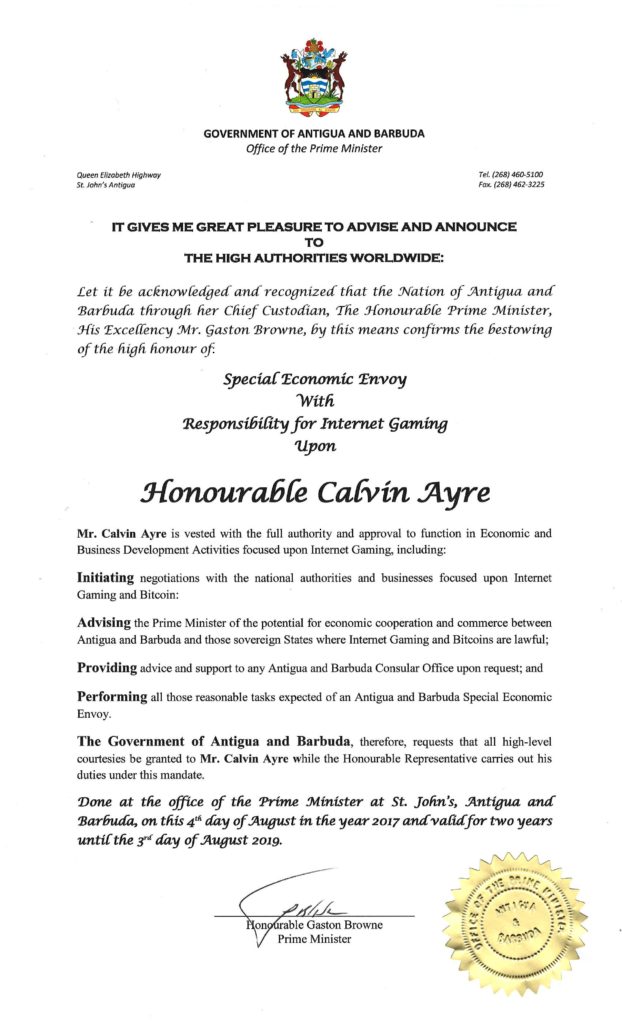Antigua Appoints Calvin Ayre Special Envoy for Cryptocurrency Matters
Here’s one of those one-off stories that’s intriguing for several different reasons: the issuance of a press release, via Bodog, stating that Bodog founder Calvin Ayre has been appointed as a “Special Economic Envoy” for the Caribbean island nation of Antigua and Barbuda regarding “technology development.” More specifically, that has to do with blockchain technology and cryptocurrencies such as Bitcoin.
 First, here’s the release in its entirety:
First, here’s the release in its entirety:
St. John’s, 8th August… The Government of Antigua and Barbuda announces the appointment of Mr Calvin Ayre as a Special Economic Envoy with responsibility for advising on economic cooperation and commerce between Antigua and Barbuda and other sovereign States where blockchain technology is being utilised.
Mr Ayre will advise the Government on the effective implementation of new technological developments in cryptocurrency and Bitcoin which have been adopted by leading companies in the United States, Australia, Denmark, the Netherlands, Sweden, Canada, China, and the United Kingdom. He has already invested heavily in Bitcoin blockchain core technology and his e-Com technology processes more Bitcoin transactions than any other platform in the world today.
As it did in offshore banking and Internet Gaming in the 1990s, the government of Antigua and Barbuda anticipates becoming an early leader in the Caribbean to compete in the international community in the provision of a legal platform for world-wide private sector activity utilising blockchain technology.
In addition to the work that his companies have done in research and development of blockchain technology and Bitcoin, Mr Ayre has a wealth of knowledge in the internet gaming sector having pioneered the development of software support for online gaming, and subsequently establishing his own gaming operations under the popular Bodog brand.
His efforts are expected to re-invigorate the Internet Gaming industry in Antigua and Barbuda which, in 1999, provided more than US$100 million to the economy and employed over 2,000 people. Today, the online gaming business is worth in excess of US$37.9 Billion annually with markets throughout Asia and Europe.
As it continues to diversify the economy and create new and high paying jobs for its people, the Government of Antigua and Barbuda looks forward to the contribution of Mr Ayre’s technological companies.
For further information please contact:
[email protected], Director-General of Communications, Government of Antigua and Barbuda or Calvin Ayre’s Press Office (Lonodon) on +44 7825 064776.
On its surface, the release has gotten very little play from most industry news outlets, in part because there doesn’t seem to be any independent, published corroboration from the online home of Merchant’s government office. Update: We have now received a formal copy of the proclamation. Here’s the image:
The presser announcing the appointment also comes just a few days after Bodog’s press arm issued a statement of congratulations from the same Antiguan official over the US’s dropping of longstanding charges against Ayre. Those charges invloved Bodog’s offering of its services to US customers, and the dropping of charges nonetheless involved an agreement by Ayre not to contest the seizure of $67 million from payment-processor intermediaries.
So, okay, Ayre has a healthy relationship with Antigua’s government, which isn’t all that surprising when one remembers that the US still owes Antigua over a quarter of a billion dollars in unpaid WTO penalties over the US’s failure to adhere to existing trade agreements.
Can Ayre “reinvigorate” Antigua’s online-gambling industry? The US’s passage of the UIGEA in 2006 crippled that sector of Antigua’s economy, and it hasn’t ever recovered amid the shift of most major international operators to white-label regulatory regimes. Ayre has certainly championed the use of cryptocurrencies as the future of online commerce, and yes, he can likely give Antigua’s online-gaming industry a few pointers in that regard.
A return to Antigua’s own golden days of online gambling, before 2006, seems less likely. Grey-market sites in general — and let’s use Bodog as a leading example — survive and thrive by filling market niches where online-gambling services aren’t otherwise available or are taxed beyond reason; Portugal might be an example of the latter. Yet these exist in a narrow niche and in something of a caveat emptor form.
If that’s a market space that Antigua wants to pursue as national policy, that’ll be interesting to watch. Cryptocurrencies do offer a certain degree of anonymity, but that’s far from complete, as recent crackdowns in the US and other countries have shown. Antigua isn’t alone in wishing to pursue crypto opportunities — Malta has proposed the same thing — but the target of the previous Antiguan online sites was, by and large, the US.
So all this paints a picture of Same Old Same Old (but with a new wrinkle), if indeed it comes to pass as imagined. Should it grow in scale the way online gambling did last decade, it would set the stage for another US-Antigua showdown. It’s more likely that it won’t happen, due to all the additional market factors, but it’s still an intriguing situation.





















COMMENTS